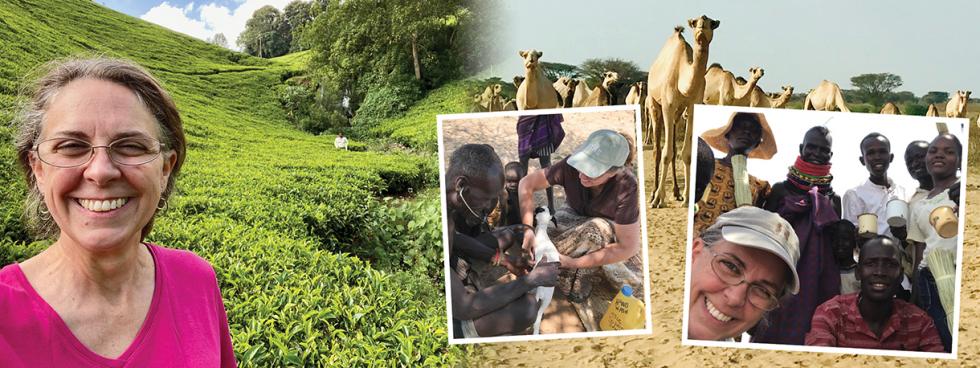
Answering a Calling
Seven years Shannon Tucker has called Kenya her home. She lives in a rectangular concrete house with a concrete floor. The water and electricity isn’t always on. Water storage tanks are backups when the water is turned off.
Tucker’s new home is in the desert of northwest Kenya. It’s dirty, windy and sandy. It’s always hot. She has to drive on the left side of the road.
She had to learn two languages and she admits she’s not good in either one – that sometimes the words don’t easily come out of her mouth. Kenya is a former British colony so now a boot is actually a car trunk, a lift is an elevator and chips are French fries.
Life can be lonely in this outpost. She misses spending birthdays, anniversaries, graduations, weddings and holidays with family and friends.
Yet the 1996 DVM graduate loves what she does.
“I do not believe anyone has a life that has no challenges, however, missionary life is full of many more than I ever experienced in the U.S.,” Tucker said.
Tucker serves as a missionary for CMF International. After graduating from Iowa State, she worked in small animal practices followed by stints as a relief veterinarian in Indiana, Kentucky and Michigan.
In 2012 she took a class, “Perspectives on the World Christian Movement.” Nine short term missionary trips to locales throughout the Western Hemisphere firmed up her conviction.
She had a calling.
A vision trip to Turkana, Kenya a year later was the deciding factor. She wanted to do missionary work on a long-term basis.
“My ministry is teaching and training using a method called CHE (Community Health Evangelism),” Tucker said. “It’s a participatory learning method of teaching and training that is spiritually based.”
Tucker and her fellow missionaries begin by learning from the people and teaching from that point forward. The hope is that the Kenyans she is missioning to will take ownership and learn to recognize their own resources and help create solutions to problems they are having.
On a daily basis Tucker uses CHE to teach basic veterinary, human and public health lessons, while focusing on women’s health. Cultural beliefs passed down through generations can be difficult to overcome. In addition to teaching in town, Tucker and her team travel out to different bush areas to teach CHE lessons a couple of times a week. The lessons generally take place under the trees.
“Some interesting things have come up as I’ve learned about their beliefs and customs around childbirth,” Tucker said. “Interestingly in many bush areas the umbilical cord is cut with a spear or men’s wrist knife if the baby is a boy.
“But if the baby is a girl, they will use a kitchen type knife. My teaching point is to educate them about cleaning the item and sterilizing before using it. It really might not matter what is used if we can convey the message about using something that is cleaner.”
Tucker’s role as a missionary is to teach, so anything she does with animals and veterinary medicine has a teaching focus. She regularly performs sterilization surgeries for her own pets (she has two cats, two guard dogs and chickens) and other expats and missionaries in the area.
The Kenyans in Turkana raise sheep, goats and camels. After years as a small animal veterinarian in the U.S., she had to relearn goat and sheep medicine.
“It is very basic medicine that we do and teach here,” she said. “I incorporate public health, learning about zoonotic diseases and handing medications.”
And while it might be windy, dirty and sandy in Turkana, Tucker has led a “charmed” life in Kenya.
“I have managed to be here seven years and never had malaria,” she said. “I have never been stung by a scorpion and I’m good at swatting to kill them with a flip flop. I have encountered only a few snakes and have never been bitten. I have been relatively healthy and able to treat myself or manage the illness and injuries I have had.”
May 2021
